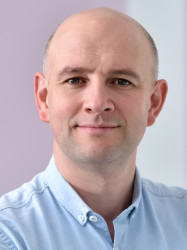Advanced Synthetic Biology - BIOE97027
Aims
This module extends from basics introduced in Foundations of Synthetic Biology and now sees the students design and model their own synthetic DNA programs for use in an application. You will have the opportunity to extend your understanding of computational modelling of biological systems through practical application, and will work on a mini-iGem project making use of synthetic biology principles, computer modelling, ethics and experimental design. This module is also available to life sciences and biochemistry students and so will allow you to work in a multidisciplinary team, and assessment exercises will help you develop your professional practice.
Role
Lecturer
Foundations of Synthetic Biology - BIOE60012
Aims
The module aim is to teach the basic foundations for synthetic biology by learning how to engineer gene expression in E.coli. This will teach students to build DNA parts into programs that get cells to perfom basic tasks in sensing, logic and biosynthesis. Students who take this course will be able to take ADVANCED SYNTHETIC BIOLOGY in their 4th year - a joint-course with Life Science students focused on a mini-iGEM project.
Role
Course Leader
Synthetic Biology - LIFE96035
Aims
Background & Aims: The advent of the molecular biology age in the 1970s was brought about by the ability to construct recombinant DNA molecules. This has completely revolutionised biology and enabled the development of ‘synthetic biology’, where new gene arrangements can be constructed and evaluated. This has been tremendously successful, leading to a wide range of biotechnological applications. However, the engineering of useful synthetic biological systems is still undertaken on an individual ad hoc basis, which is expensive and inefficient. Synthetic biology as a discipline is now attempting to apply the principles of engineering and develop foundation technologies that make the design and construction of engineered biological systems easier, facilitating future development in biotechnology. This course will explore the challenges, problems and approaches to engineering biological systems.
Role
Lecturer

